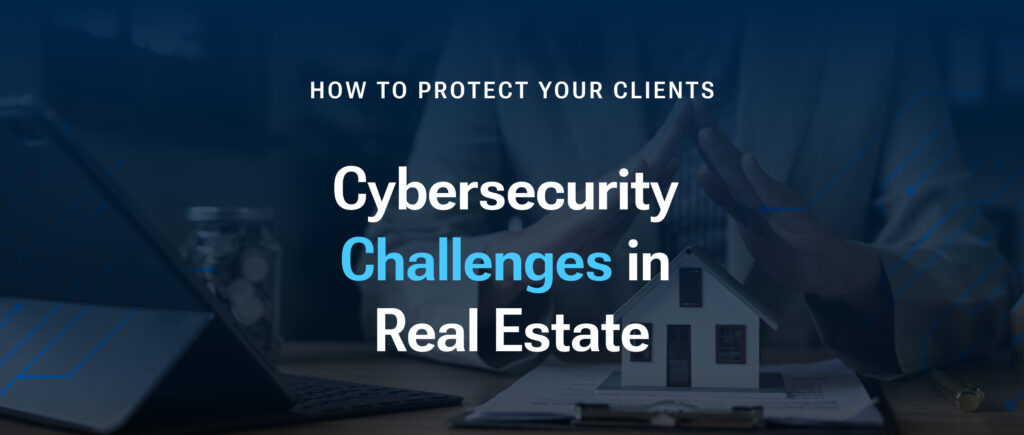In the real estate industry, cybersecurity is more important than ever. As real estate transactions increasingly move online, the threat of cyber-attacks continues to rise. For real estate professionals, protecting sensitive client data is paramount, especially when dealing with large financial transactions and confidential information. Cybersecurity challenges in real estate range from email phishing scams to wire fraud, and failing to address these risks can lead to significant financial and reputational damage. This blog will explore the main cybersecurity challenges in real estate and provide actionable steps to protect your clients.
1. The Growing Cybersecurity Threat in Real Estate
Real estate has become a prime target for cybercriminals due to the large sums of money involved in transactions and the sensitive nature of the data handled. From financial details to personally identifiable information (PII), real estate firms are a goldmine for hackers. Additionally, the widespread use of digital tools and communication platforms makes it easier for cybercriminals to exploit vulnerabilities.
Key Risks Include:
- Phishing Attacks: Hackers send fraudulent emails to real estate professionals or clients, often disguised as legitimate communications from lenders, title companies, or attorneys.
- Wire Fraud: Cybercriminals infiltrate email systems, posing as real estate agents to trick clients into wiring money to fraudulent accounts.
- Data Breaches: Hackers gain unauthorized access to sensitive client information, which can be sold on the black market or used for identity theft.
2. Understanding the Consequences of Cyber Attacks
The consequences of a successful cyber attack on a real estate firm can be severe. Besides the financial loss from wire fraud or data theft, there’s the risk of legal ramifications if client data is compromised. Moreover, the reputational damage can be irreversible, with clients losing trust in your ability to protect their information.
3. Best Practices for Securing Real Estate Transactions
Implementing strong cybersecurity protocols is crucial for safeguarding your firm and your clients. Here are some best practices to follow:
- Email Encryption: Encrypt all emails containing sensitive information to prevent unauthorized access. This ensures that even if an email is intercepted, the data remains unreadable.
- Two-Factor Authentication (2FA): Require 2FA for all logins to your firm’s systems and email accounts. This adds an extra layer of security by requiring a second verification step.
- Regular Cybersecurity Training: Educate your team on the latest cyber threats, including phishing scams and social engineering tactics. Ensure they know how to recognize suspicious emails and avoid clicking on unverified links.
- Secure Communication Channels: Use secure platforms for document sharing and communication. Avoid using personal email accounts for real estate transactions, as they are more vulnerable to hacking.
For comprehensive protection, consider working with a Managed IT Services provider. Managed IT services can offer continuous monitoring of your network, provide email encryption solutions, and regularly update security protocols to protect your real estate transactions.
4. How Managed IT Services Enhance Cybersecurity in Real Estate
Partnering with a managed IT service provider, like Advance Network Design, offers numerous benefits to real estate firms, including proactive cybersecurity measures. We help protect your firm’s digital infrastructure by:
- Monitoring and managing your network for potential threats.
- Providing secure data storage and backup solutions to ensure that sensitive client information is protected.
- Offering cybersecurity audits to identify and close potential vulnerabilities in your system.
- Regularly updating security software to guard against the latest threats.
With managed IT services, your real estate firm can stay ahead of cyber threats, allowing you to focus on your business while leaving cybersecurity to the experts.
5. The Importance of Backup Data Solutions in Real Estate
Data loss can be catastrophic for a real estate firm. Whether it’s due to a cyber attack, system failure, or natural disaster, losing client data can halt transactions and damage client relationships. Ensuring you have a reliable backup data solution in place is essential for protecting your business from these risks.
Managed IT services can implement disaster recovery plans that include regular data backups, ensuring that in the event of a breach or failure, your firm’s operations can quickly resume without losing critical information.
6. Case Studies: Cybersecurity Incidents in Real Estate
Several high-profile cases have shown how devastating a cyber attack can be for real estate firms. For example, a 2020 case involving a New York real estate firm saw hackers steal over $200,000 from a client by intercepting and altering wiring instructions. Cases like this highlight the need for robust cybersecurity measures.
7. Conclusion: Protect Your Real Estate Business
The cybersecurity challenges in real estate are ever-evolving, and it’s essential to stay vigilant. By adopting the best practices outlined in this post and partnering with a trusted Managed IT Services provider like Advance Network Design, you can protect your clients, safeguard their data, and ensure your firm remains secure in an increasingly digital landscape.
FAQs:
1. What are the common cybersecurity threats in real estate?
Common threats include phishing attacks, wire fraud, and data breaches targeting sensitive client information.
2. How can managed IT services improve cybersecurity for real estate firms?
Managed IT services provide continuous monitoring, secure data storage, and implement robust cybersecurity protocols to protect real estate transactions.
3. Why is email encryption important in real estate transactions?
Email encryption ensures that sensitive information is protected from unauthorized access during digital communication.
4. What is the role of two-factor authentication (2FA) in cybersecurity?
2FA adds an extra layer of security by requiring a second verification step, making it harder for hackers to gain access to accounts.
5. How can data backups protect real estate firms?
Regular data backups ensure that critical client information is not lost in case of a cyber attack, system failure, or natural disaster.
6. What are the cybersecurity concerns for real estate firms in Oklahoma City?
Like many other regions, real estate firms in Oklahoma City face risks such as wire fraud and phishing attacks targeting local transactions.
7. How can real estate firms in Edmond enhance their cybersecurity?
Firms in Edmond can improve cybersecurity by adopting secure communication platforms, email encryption, and regular cybersecurity training for staff.
8. What are the benefits of managed IT services for real estate firms in Midwest City?
Managed IT services offer real estate firms in Midwest City continuous monitoring, backup data solutions, and disaster recovery services.
9. Why should real estate firms in Nichols Hills consider cybersecurity audits?
Cybersecurity audits help identify vulnerabilities in a firm’s digital infrastructure, providing recommendations for improvement.
10. What are the cybersecurity best practices for real estate firms in The Village?
Firms in The Village should implement email encryption, secure data backup, and two-factor authentication to safeguard transactions.
11. How can real estate firms in Warr Acres protect client data?
Firms in Warr Acres can partner with managed IT services to ensure secure communication channels and regular system updates.
12. What disaster recovery solutions are available for real estate firms in Woodlawn Park?
Managed IT services can provide Woodlawn Park firms with disaster recovery solutions, ensuring business continuity in case of a cyber attack.

